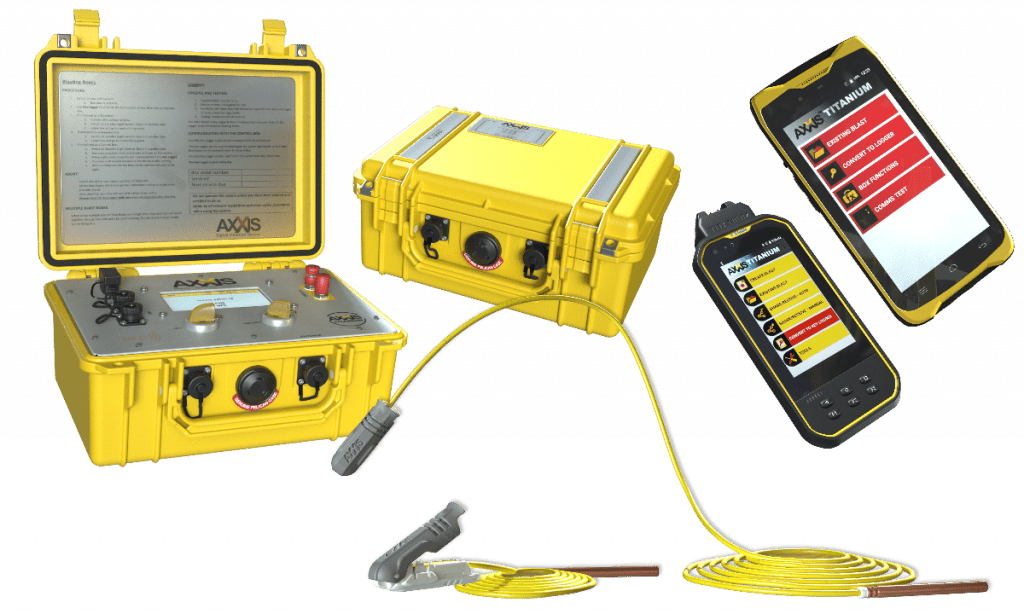Safe and efficient blasting has taken a momentous step forward with OMNIA Group company BME’s launch of AXXIS Titanium , one of the world’s most advanced electronic blast detonation systems.


The new AXXIS TITANIUM system – Manufactured by BME
BME Managing Director (SADC), Ralf Hennecke has hailed AXXIS Titanium as a significant advance for the company’s ever-evolving technology offering, securing BME’s position among the global leaders in electronic delay detonator (EDD) design.
“Our release of AXXIS Titanium raises the bar globally for the electronic detonator market,” said Hennecke. “This flagship product reflects our continued focus on digital advancement on mines, and is designed to seamlessly integrate with BME’s software systems and hand-held digital tools.”
AXXIS Titanium improves safety levels and manufacturing quality through enhanced communication with the detonator during manufacturing to avoid defects. Performance is raised through the increased blast duration per detonator, more units per blasting box and precise firing accuracy.
“Most importantly, the AXXIS Titanium system was built for the blaster and blast engineers who work with the product every day,” he said. “The robustness of the wire, the easy-to-use interface and the improved integration will improve efficiency in terms of time, data and reporting.”
As the latest generation of BME’s popular and well-proven AXXIS system, AXXIS Titanium takes blasting safety and flexibility to a new level, according to Tinus Brits, BME’s Global Product Manager for AXXIS . BME has over the decades made regular advances in the performance, safety and reliability of this innovative solution, said Brits.
“This latest iteration builds on the achievements of the AXXIS GII model and raises the bar on many of the features that have served our customers so well,” he said. “These include further refinements in safety, accuracy, flexibility, ease of use and speed in preparing each blast.”
Safety remains the watchword, with the incorporation of a Swiss-designed application-specific integrated circuit (ASIC) chip in the BME detonators, delivering several added benefits. The ASIC gives the system more internal safety gates against stray current and lightning, enhancing safety levels and allowing for inherently safe logging and testing.
Dual safety
“A unique innovation is our use of dual capacitors and dual voltage, allowing us to conduct low voltage logging to avoid any chance of detonation,” he said. Blasts are initiated by a robust, encrypted blast command ensuring that detonators all receive their respective commands and fire as planned. He emphasised that the detonator will only react if it receives the correct, encrypted firing sequence from the blasting equipment, not from any other source.
“We have developed AXXIS Titanium to be resistant to electro-magnetic pulses (EMPs) caused by the blast, which can affect the accuracy of detonators or even cause them to fail,” he said. “Our intensive tests in conjunction with the Council for Scientific and Industrial Research (CSIR) showed that our detonators can withstand a significant EMP without any impact on their timing.”
He noted that underground blasting – within confined spaces – made detonators particularly susceptible to re-setting and misfiring due to voltages from EMP, as well as from dynamic pressures. Over-moulding of all components on the electronic board protects the detonators against dynamic pressures, and isolates components from any induced ground currents – such as electrostatic discharge and lightning strikes.
Custom designed,
Swiss-engineered ASIC microchip in each detonator
Easier timing, more dets
The ASIC chip boasts more memory and processing speed, facilitating easier timing and centralised programming if the timing needs to be changed after being conducted on the bench. It also achieves lower power consumption with the incorporation of dual capacitors – so more detonators can be initiated per blast. The system can now manage 1,000 detonators per blasting box, doubling the capability of the previous generation.
Brits also noted that up to 20 blasting boxes can be linked and synchronised through hard wiring, enabling the possibility of initiating up to 20,000 electronic detonators in a single blast – doubling the capacity of the AXXIS GII generation.
“AXXIS has been proven in some of the largest mining blasts on record, giving mines the opportunity to conduct fewer blasts – thereby reducing downtime due to pit closures,” he said. “The ultra-low energy micro-chip is also less susceptible to leakage and cable resistance and extends the firing time to a maximum of 35 seconds.”



